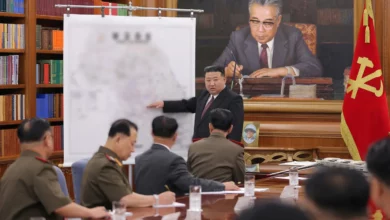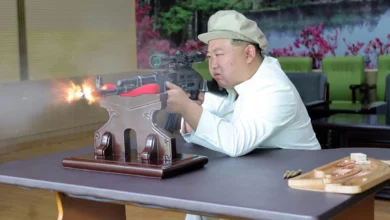Seoul–North Korea Saturday threatened to attack loudspeakers set up to broadcast South Korean propaganda and said it could turn Seoul “into a sea of flame” as tensions flared over the sinking of a warship.
The North’s General Staff of the Korean People’s Army made the threat in response to Seoul setting up the speakers at 11 locations along the tense border to resume anti-Pyongyang broadcasts which have been suspended since 2004.
“The revolutionary armed forces of the DPRK (North Korea) will launch an all-out military strike to blow up the group’s means for the psychological warfare,” it said in a statement.
“It should bear in mind that the military retaliation of the DPRK is a merciless strike foreseeing even the turn of Seoul, the stronghold of the group of traitors, into a sea of flame,” it said.
Tensions are high after a multinational investigation said last month a submarine from the North torpedoed a 1,200-ton South Korean corvette near the disputed sea border in the Yellow Sea, with Pyongyang angrily denying responsibility.
The installation of the loudspeakers amounted to “a direct declaration of a war” and a “flagrant violation” of the inter-Korean declaration for peace and reconciliation signed in 2000, the North’s statement went on.
“Therefore, the revolutionary armed forces of the DPRK will launch an all-out military strike to blow up the group’s means for the psychological warfare,” it said.
The North has repeatedly threatened to strike down the loudspeakers if Seoul goes ahead with the broadcasts.
The statement, published by Pyongyang’s official Korean Central News Agency, described the loudspeakers as “a hideous provocative act of infringing upon the dignity and supreme interests of the DPRK”.
South Korean Defense Minister Kim Tae-Young told parliament Friday that Seoul and Washington had agreed that the broadcasts should not be resumed before the UN Security Council discusses the sinking.
A South Korean Joint Chiefs of Staff spokesman told AFP there was no unusual movement of North Korean troops deployed along the border despite the threat.
Another Joint Chiefs of Staff official told Yonhap news agency that South Korean soldiers were on alert against possible provocation.
The two Koreas stopped decades of propaganda warfare in 2004 as relations thawed following the first summit of their leaders in 2000.
They agreed in 2004 to halt the official propaganda to ease relations, although the North still complains strongly about private Seoul groups which launch anti-Pyongyang leaflets across the tightly guarded frontier.
On Friday, the North warned of “merciless” measures against the South for referring to the UN Security Council to censure the communist state over the sinking.
A spokesman from its powerful National Defense Commission, chaired by leader Kim Jong-Il, warned the UN of “serious” consequences for peace if it debates the sinking without letting the North’s investigators examine the evidence.
North Korea accuses Washington and Seoul of a “smear campaign” to fake evidence of its involvement and says reprisals already announced by the South, including a trade suspension, could spark war.
The two Koreas have remained technically at war since the end of the 1950-1953 conflict, and each waged a cross-border propaganda campaign during and after the Cold War.




